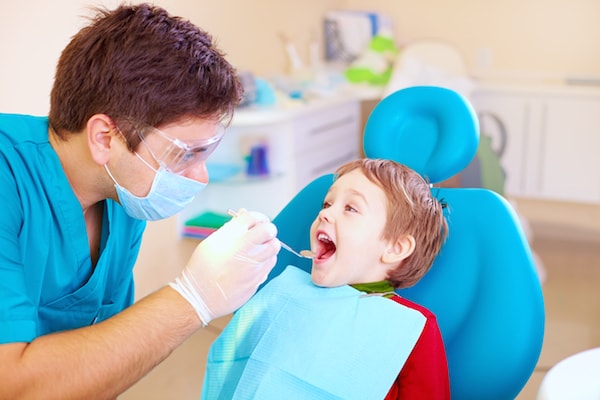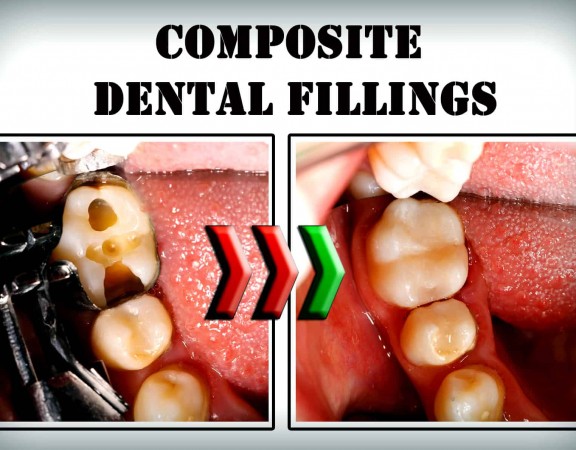 It is not unusual for a child to exhibit a fear of going to the dentist. Research shows that dental anxiety can produce significant panic symptoms. Some panic symptoms may include sweating, trembling or shaking, dizziness, fainting and paresthesias which is a tingling or numbness. Some patients may develop diverse panic symptoms such as a gag reflex or choking sensation from various anxiety-producing treatments. Dental phobia can cause parents to delay making a dental appointment. However, this can lead to poor dental care, poor oral health and an increased fear of the dentist due to corrective dental treatments.
It is not unusual for a child to exhibit a fear of going to the dentist. Research shows that dental anxiety can produce significant panic symptoms. Some panic symptoms may include sweating, trembling or shaking, dizziness, fainting and paresthesias which is a tingling or numbness. Some patients may develop diverse panic symptoms such as a gag reflex or choking sensation from various anxiety-producing treatments. Dental phobia can cause parents to delay making a dental appointment. However, this can lead to poor dental care, poor oral health and an increased fear of the dentist due to corrective dental treatments.
Children are generally afraid of the dentist for one of three reasons:
- They don’t know what to expect
- Had a bad experience in the past
- They are fearful because they learned it from a family member.
Identifying fears, and building positive experiences with the dentist, can help a child conquer dental fears. Here are some suggestions to help kids overcome their fear of the dentist.
- Start early
Dental care should start even before a baby has teeth. After feeding the baby, clean the gums using a baby toothbrush or a wet cloth. Teaching oral hygiene at an early age teaches kids to keep their mouth clean and promotes better oral care as they get older.
- Have a chat about the dentist
Talking to kids about what to expect at the dentist can help them feel more comfortable. Tell them about the funny spit sucker straw, tickling toothbrush and shiny tooth checker tools. Read a book about going to the dentist and point out the tools during the story.
- Imagine being at the dentist
Take turns in a recliner or on the couch and pretend to be the dentist. Make dental office sounds as you pretend to check the teeth. Children, especially anxious ones, tend to do better when they have a sense of predictability. Be sure to describe the noises they will hear and vibrations they will feel during the visit. Encourage the child to make hand gestures when they need a break. This will allow the child more control over the situation and develop a trust between the child and dentist.
- Stay positive
Parents often project their negative experiences onto their child. The child picks up on this instantly and perceives it as their fears. Dental techniques have changed so, regardless of their own past experiences, keep it positive for the child. Talking about pain or discomfort will only increase any fear the child feels. Instead, talk about how clean and healthy their teeth will feel.
- Visit a pediatric dentist
Children should visit a different dentist than their parents. A pediatric dentist is trained to work with children including those who are anxious and those with special needs. Pediatric dentists usually have kid-friendly offices designed with bright colors, videos, toys and smaller instruments. Visit the dentist office prior to the appointment so kids can meet the staff.
- Pack a bag
Allow the child to pack a small bag of their favorite books, toys and stuffed animals for comfort or fun. Children who have never been to the dentist will love preparing a fun bag to take along with them. Children who are anxious about the dentist will appreciate the comfort of their favorite items.
- Teach relaxation techniques
Relaxation techniques should be taught at an early age to help children learn coping skills towards moments of anxiety, fear or anger. Teaching children to simply take a deep breath, with slow exhalations in a paced manner, can help with many situations. Progressive muscle relaxation can also be a helpful technique for anxiety. Progressive muscle relaxation involves tensing and releasing groups of muscles while the eyes are closed. It can be done in the dental chair or even on the way to the office.
- Reward brave behavior
Small rewards such as stickers or temporary tattoos can be used to praise a child and reward them for their brave behavior. An incentive system can also be set up with the dentist. The child could receive tokens for each portion of the procedure and then “cash in” his or her tokens for a small treat, from the parents, after a successful office visit.
– SP





